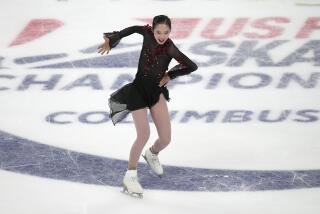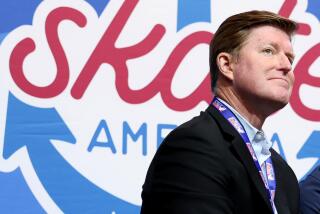World Figure Skating Championships : Orser Finally Has His Long-Sought Gold Medal
- Share via
CINCINNATI — Considered the world’s best freestyle skater since the 1984 Winter Olympics, Canada’s Brian Orser finally has a gold medal to show for it.
After four straight second places in major international competitions, Orser, 25, finished first in the long program at Riverfront Coliseum Thursday night to win Canada’s first men’s world figure skating championship since 1963.
“What a hell of a night,” said Doug Leigh, Orser’s coach for the last 15 years. “It’s been a long time with those silvers.”
To win the gold, Orser had to beat a couple of previous world champions, 1986 winner Brian Boitano of Sunnyvale, Calif., and 1985 winner Alexandr Fadeev of the Soviet Union.
Boitano and Fadeev, both 23, finished second and third, respectively, in the long program, which is where they also finished in the overall standings.
At least Boitano was consistent. He also finished second in the other phases of the competition, the compulsory figures and the short program. Orser finished first in the short and long programs.
“I don’t think it matters what place we’re in this year,” Boitano said after the short program Tuesday night. “It’s going to be the same three again next year.”
In that case, Orser will have the home-ice advantage. The next time all three figure to meet is in the 1988 Winter Olympics at Calgary.
It was a disappointing night for Boitano, who for the third time in competition failed to complete the quadruple toe-loop. No one has ever completed a quadruple jump in competition before.
Boitano slipped on his landing, breaking his fall with both hands on the ice behind him.
He was optimistic entering the program because he landed the jump during his warm-up.
“That’s the best I’ve ever done it in front of people, in the warm-up,” Boitano said. “So that’s a start.”
In an interview this week with the Cincinnati Enquirer, Orser criticized Boitano for including the quadruple jump in his program.
“I think Boitano’s whole program is designed around it,” Orser said. “His program is not as zippy as it was in the past. It doesn’t have the flair it had in the past because of the emphasis on the quad.”
But Boitano denied his program suffers because of the quadruple jump, defending his use of it.
“I know I want to do it in the Olympics,” he said. “I didn’t want to debut it in the ’88 season.”
Orser’s program, meanwhile, could hardly be described as conservative, although he did leave out the last of the seven triple jumps he planned.
He became the first person in a world championship to complete two triple axels, including one late in the 4 1/2-minute program.
“It’s almost impossible to pull one of those off with 40 seconds to go,” Leigh said. “But I don’t make any bones about it. We needed it.”
It wasn’t that close, but Orser couldn’t have known because he skated first and then watched the other two skate on the closed-circuit television in the press room.
All but two of the nine judges had Orser ranked first, and all but one of the judges had Boitano ranked ahead of Fadeev, who skated with a pulled groin muscle and completed only four triple jumps.
None of the three skated up to their capabilities.
“On a given night, I’ve seen the Edmonton Oilers skate better,” a Toronto Sun reporter said, exaggerating slightly.
The only one of the 24 skaters who really dazzled the capacity crowd of 14,506 was Christopher Bowman of Van Nuys.
Considered the heir apparent in the United States after Boitano retires in 1988, Bowman, 19, finished fifth in the long program, although he outstaked everyone, including the three leaders.
Bowman finished seventh overall, just behind Victor Petrenko, 17, who is considered the future star of Soviet skating.
Asked to explain why the fans would be wrong if they left the Coliseum thinking Bowman was the best skater they saw Thursday night, his coach, Frank Carroll of the Los Angeles Figure Skating Club, said: “They wouldn’t necessarily be wrong. But they have to understand that the judges have to see him. This is his first world championship. He did all you can expect in your first year.”
The other American, Scott Williams of Redondo Beach, finished 11th in the long program and 10th overall.
Orser’s championship is a tribute to persistence.
“He has a tough, no-nonsense attitude,” Leigh said.
Orser won the short and the long programs at the 1984 Winter Games in Sarajevo but finished second overall to American Scott Hamilton because of a seventh place in the compulsory figures.
After that, Orser was second in three straight world championships--to Hamilton in 1984, to Fadeev in 1985 and to Boitano in 1986.
But Orser put himself in position to win this year when he finished third in the figures Monday, his best finish ever in that phase of the competition.
He said that since the first of the year, he has been through 12 simulated figures competitions in his Orillia, Ontario, home rink, known since 1984 as the Brian Orser Arena.
“We’ve had photographers clicking their cameras and everything,” he said.
Orser said in the past that he’s been so frustrated by his second-place finishes that he’s considered retirement, but he said Thursday night that his disappointment last year made him more determined than ever.
“The day I got home from Geneva, I was ready for Cincinnati,” he said. “So it’s been a long year.
“I’ve always wondered how it would feel to win. I thought it might not happen to me. Now that it has, it’s a hard feeling to describe.
“I’m sure the other two guys know.”
Boitano hit six of the seven triple jumps in his program cleanly, but besides falling on the quadruple, he also stumbled on his final move, an Arabian spin.
“I feel I didn’t skate my best,” Boitano said. “I thought I’d be more disappointed. I thought if I lost my world title, it’d be hard for me. But, sitting here, I can already see that life goes on. I’ll probably be a better skater because of this.”
He also had to feel good because one of his best friends, Orser, won the championship.
“If he had gone his whole career without a gold medal, it wouldn’t have been real justice,” Boitano said.
After finishing fifth in the compulsory figures Wednesday, East German Katarina Witt won the women’s short program Thursday and moved into second place overall behind the Soviet Union’s Kira Ivanova.
Defending champion Debi Thomas of San Jose fell on one of her required elements, the double axel, and finished seventh in the short program. She dropped to third overall.
“The double axel is one of the more difficult elements, but it’s not difficult for me because I’ve been doing it since I was 10 years old,” said Thomas, adding that she had not been affected by her injured Achilles tendons.
Any one of the three leaders will win the championship if she finishes first Saturday in the long program.
But considering that Witt, the 1984 Olympic champion, is the world’s best freestyle skater, Thomas said she’s not optimistic about defending her championship.
“I’m going to need a miracle program to win,” she said.
Two other women, fourth-place Elizabeth Manley of Canada and fifth-place Caryn Kadavy of Erie, Pa., also are in gold-medal contention.
U.S. champion Jill Trenary of Minnetonka, Minn., finished fourth in the short program and improved from 11th to 8th in the overall standings.
The dance finals are scheduled for tonight.
More to Read
Go beyond the scoreboard
Get the latest on L.A.'s teams in the daily Sports Report newsletter.
You may occasionally receive promotional content from the Los Angeles Times.






